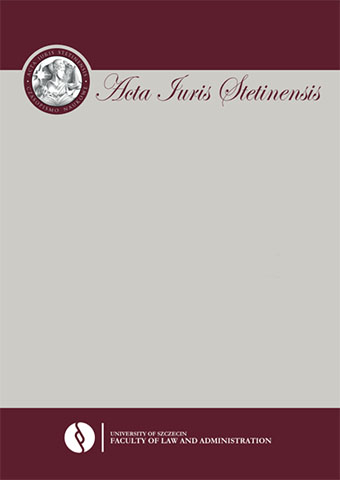







| Authors: |
Mariusz
Nawrocki
Uniwersytet Szczeciński |
| Keywords: | detention ne peius rules complaint |
| Data publikacji całości: | 2015 |
| Page range: | 14 (47-60) |
| Downloads ?: | 562 |
| 1. | K. Dąbkiewicz, Tymczasowe aresztowanie, Warszawa 2012, |
| 2. | J. Izydorczyk, Stosowanie tymczasowego aresztowania w polskim postępowaniu karnym, Kraków 2002, |
| 3. | J. Skorupka (red.), Kodeks postępowania karnego. Komentarz, Warszawa 2015, uwagi do art. 258, teza 1; |
| 4. | K.T. Boratyńska, A. Górski, A. Sakowicz, A. Ważny, Kodeks postępowania karnego, Komentarz, Warszawa 2014, uwagi do art. 249, teza 1; |
| 5. | P. Hofmański (red.), E. Sadzik, K. Zgryzek, Kodeks postępowania karnego. Komentarz do artykułów 1-296, Tom I, Warszawa 2011, |
| 6. | M. Cieślak, Polska procedura karna. Podstawowe założenia teoretyczne, Kraków 2011 |
| 7. | Sąd Apelacyjny w Krakowie (w uzasadnieniu wyroku z dnia 14 sierpnia 1997 r., II AKa 171/97, LEX nr 30489) |
| 8. | Z. Doda, Dopuszczalność zażalenia w polskim procesie karnym, Kraków 1982, |
| 9. | K. Marszał, Zaskarżalność decyzji wydanych w procesie karnym, Przegląd Sądowy 2007, nr 3, |
| 10. | Z. Doda, Zażalenie w procesie karnym, Warszawa 1985, |
| 11. | postanowienie Sądu Najwyższego z dnia 9 lipca 1996 r., IV KZ 34/96, LEX nr 26357. |
| 12. | Wyrok Sądu Apelacyjnego w Krakowie z dnia 14 sierpnia 1997 r., II AKa 171/97, LEX nr 30489. |
| 13. | postanowienie Sądu Apelacyjnego w Krakowie z dnia 9 lutego 2005 r., II AKz 23/05, LEX nr 150379 postanowienie Sądu Apelacyjnego we Wrocławiu z dnia 1 sierpnia 2001 roku, II AKz 367/01, LEX nr 54281. |
| 14. | L.K. Paprzycki (red.), J. Grajewski, S. Steinborn, Kodeks postępowania karnego. Tom II. Komentarz do art. 425-673, Warszawa 2013, uwagi do art. 426, teza 4. |
| 15. | A. Zachuta, Zaskarżalność orzeczeń sądu odwoławczego, „Prokuratura i Prawo” 2005, nr 2, |
| 16. | W. Jasiński, Tymczasowe aresztowanie: wątpliwości pozostały, „Rzeczpospolita” PCD 2011/3/4. |
| 17. | Ł. Chojniak, Glosa do wyroku Trybunału Konstytucyjnego z 13 VII 2009, SK 46/08, „Państwo i Prawo” 2010, nr 7, |
| 18. | A. Kaftal, Kontrola sądu nad tymczasowym aresztowaniem w świetle orzecznictwa S.N., „Państwo i Prawo” 1972, z. 12, |
| 19. | R.A. Stefański, Zaskarżalność postanowień w przedmiocie środka zapobiegawczego (w:) Środki zaskarżenia w procesie karnym. Księga pamiątkowa ku czci prof. Zbigniewa Dody, pod redakcją A. Gaberle i S. Waltosia, Kraków 2000, |
| 20. | postanowienie Sądu Najwyższego z dnia 14 lutego 2002 r., II KKN 337/01, OSNKW 2002, nr 7-8, poz. 66; wyrok Sądu Najwyższego z dnia 11 grudnia 2002 r., V KK 328/02, LEX nr 75500; |
| 21. | postanowienie Sądu Najwyższego z dnia 9 września 2004 r., V KK 92/04, LEX nr 137751. |
| 22. | postanowienie Sądu Najwyższego z dnia 7 czerwca 2006 r., III KK 395/05, OSNKW 2006, nr 10, poz. 92, LEX nr 197163. |
| 23. | Wyrok Sądu Najwyższego z dnia 12 grudnia 2012 r., SNO 20/12, LEX nr 1250867. |